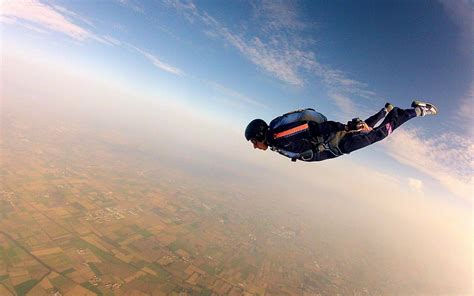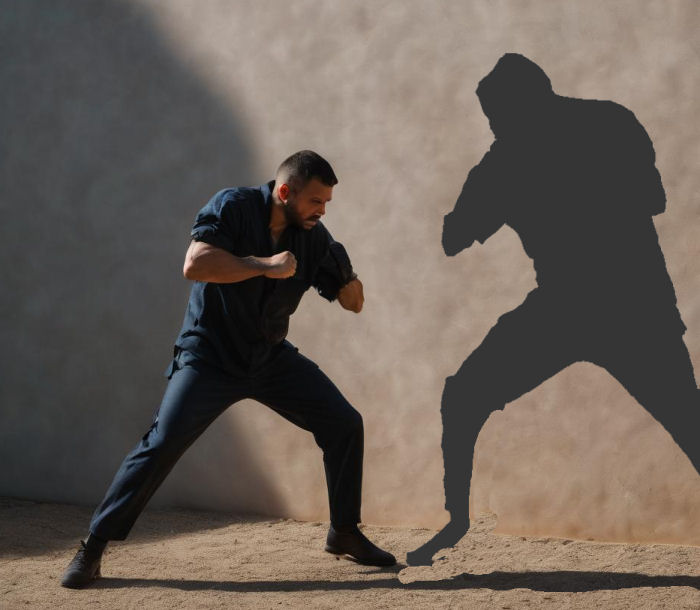Take a moment to listen to yourself as you read these words. Do you trust yourself?

Picture yourself holding a sharp knife on a day when you’re feeling down, or driving alone on an empty road and contemplating speeding up. You jump from the side of a plane, as the ground looms ever closer with each second seeming like a lifetime. You are mesmerised as the shape of trees and ground features expand to fill your view, your safety harness with about 12-15 seconds to impact is beeping “Pull the cord now!” For that one second you hesitate, if you don’t pull the parachute cord now you could painlessly sleep forever. These thoughts may seem unsettling, but they reveal a possible deeper conflict within ourselves.
The lack of self-trust is more common than you might think. Let’s have an honest conversation. Most people struggle to trust, like, or be truthful with themselves. They constantly seek love, appreciation, and a sense of belonging. There is a profound longing to be accepted, acknowledged, and treated with kindness—to be truly seen.
However, when we are fortunate enough to be seen in our vulnerable state, we often hide or run away, fearing that others will witness our desperate need for comfort without judgment or criticism. This human condition ensnares most of humanity, seemingly without hope of liberation.

Have you ever wondered why so many turn to spirituality or religion? It frequently stems from a place of desperation. This internal struggle is rarely discussed because it serves the interests of those who run our world to keep humans internally divided. Divided individuals are easier to manipulate and turn against one another, whether it be neighbours or foreign populations. There is always an external enemy to reflect the enemy within.
Many people become consumed with wanting to change the world, and it’s understandable. However, the real dictators are not external; they reside in our minds. Changing ourselves can lead to changing the world, but it’s challenging to grasp this concept when we know so little about ourselves to begin with.
So, who are you? Let me offer some guidance. You are likely a mass of contradictions. On one hand, you have biological and emotional needs, while on the other, you carry the weight of centuries of societal rules and regulations that shape your behaviour. Deviating from these norms can result in punishment such as imprisonment, physical harm, financial extortion, excommunication, or social exclusion.

The need to conform runs deep within our biological psyche. We are expected to suppress our emotions, self-censor, and restrain ourselves. It’s hard to imagine a lion tolerating disrespect without taking action. That impulsive surge of hormones that energizes our muscles for self-defence would be called anger. Yet, most of us have been taught that anger is unacceptable, and over time, we suppress the emotion. We become victims, exploding from time to time on innocent bystanders with our “rage”. Then we feel remorse, embarrassment, and probably punish ourselves.
The same holds true for other emotions like grief, jealousy, abandonment, hate, rancour, and fear. We have learned that these negative emotions are unacceptable in certain social strata because they make others uncomfortable. While some negative emotions are more easily expressed, there are always a few that we struggle with as individuals.
But who is this “we” that struggles? It is our minds—the constant chatter in our heads, repeating nonsensical thoughts like a broken record. Those who cannot cope with this internal turmoil are often labelled as mentally unstable, “out of their minds,” or “off their rockers.” As a society, we blame the mind for not controlling our emotions, as only savages assert their personal space. This is not an endorsement of violence, but rather an illustration of the price we pay for conformity.
Sadly, many people end up seeking help from doctors who prescribe medication to chemically alter their body’s chemistry, to suppress the pain of unexpressed emotions. In today’s “Woke culture,” we are even prescribing, and sometimes legislating (hate speech laws), the avoidance of emotional pain and disturbance. The perception is, that individuals are fragile beings easily hurt by the words of others. This is not a healthy path to follow, but it reflects the internal struggles within people’s psyches.

Our minds try to protect us by denying certain experiences, fearing that we may break under the emotional intensity. While this may have been true when we were five years old, if we shield a child from the world, they will grow up weak because the world is inherently unfair and unjust.
The true conflict in the world is not external but internal—a battle between the enslaved mind and the suppressed reactive emotions. As long as we remain divided within ourselves, there can be no lasting peace on Earth.
For those seeking spiritual enlightenment, as in the Holy Grail in Arthurian legend, this is the frontier that must be explored and navigated to discover the true treasure at the end of the quest—self-love.
I may have gone overboard with hyperbole, but human beings are relatively straightforward to understand. We have grown up lopsided and emotionally stunted. Our minds have been filled with rules and regulations that control and suppress our behaviour and emotional expression causing us to lose our individuality, flexibility of thought and creativity. We are desperate to be seen and loved for who we truly are, yet we fear the consequences of revealing our authentic selves.
One overriding trait lurks in the back of most people’s minds: the need to be special. This need may be so deeply buried that it will affect our behaviour from the shadows of our subconscious. We want to be special to our parents, our children, our lovers, our friends. Sometimes this ‘need’ is hidden within external means such as positions of power, and control, be it within a government, bureaucracy, business firm, or sought-after labels (Ph.D., Doctor, Sir, Lord, prince, king etc.). Even spiritual seekers are not immune from perceived status – Guru, Healer, Psychic, magician, conjurer, Witch, priest.
Contentment in this life is about none of the above; it is about being ordinary
I often speak about being ordinary, it sounds such a demeaning word. Yet on the contrary, in this modern world to be truly ordinary is no mean feat.
*It requires experiencing all our emotions, without reacting to them.
*It entails seeing the weaknesses in ourselves with compassion and understanding
*It needs us to be our own best friend and lover
* It means recognizing that there is a pattern of intelligence behind life, surrendering to it, and flowing with it.
*It entails the recognition that we are ALL damaged as human beings sharing the same boat, no one is better or worse,
To be ordinary is to be connected to the sensory apparatus of our bodies, to experience and allow to flow the whole gamut of emotions within ourselves. To have a heart that freely opens or shuts as appropriate, and which when open allows us in that silence of feeling to hear the inspiration that arises from the Intelligence beyond this World of Matter.
And how do we get there? I began this article with a question “Do, you trust yourself?” This question is in a way misleading, for if you truly knew yourself then there would be no conflict within you to be weary of.
To have inner trust is to be connected to all aspects of oneself. And this world is designed to keep and maintain us in a fractured state.

Imagine you are the proud parent of a young child, freshly minted and open-hearted. If you are cross with him /her unfairly how long will that trust last? How about if you lie, or are violent? Physically, mentally abusive? Dismissive of his/her emotional states? Inattentive to his/her concerns? You get my drift, love begets love and violence/domination begets fear/reaction.
Now apply this insight to your own personality, you will be conflicted because some of your needs are suppressed by your chattering mind that behaves like a strict parent.
Here are a few useful pointers to self-integration:
This is the overriding and all-encapsulating Phrase – SEE YOURSELF -warts and all
We need to truly SEE ourselves, No more lying. Compassion, love, and acceptance require empathy which in turn means self-observation.
The world is constantly pulling us away from ourselves. Through detached self-observation, we start the process of appreciation and integrating the fractured pieces.
Firstly, We connect with our bodies and its numerous sensations, we focus on its structure, and with our eyes shut, we want to be able to sense all the limbs’ torso, neck, and head and its spatial position and posture. We want to be able to walk down the road connected to our feet propelling us forward, we want to be one (trust) with our body without interfering with its movements.
As we connect with our bodies our minds go quiet and we are present with the passage of time. Suppressed emotions will spontaneously arise appropriately to our present capacity for emotional intensity. Trust your body and your child to express themselves spontaneously without criticism.
As we become emotionally clear of the backlog, we will have increasing integration of our three centres and a feeling of ‘Self’ will grow within us, our hearts will open up more and more, and we will SEE ourselves compassionately.
Here is a joint zoom session with a client who willingly partook in sharing of some of his struggles with his shadow self.
Further similar articles: